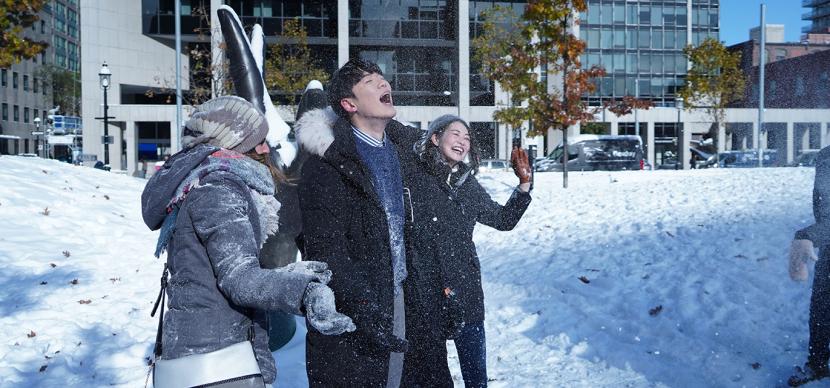20 English Winter Idioms
This is the time of year for crisp wind, wool scarves, and thick coats, which means that winter is fully upon us. Aside from the traditions of building snowmen, snacking on peppermint-flavored sweets, and sipping hot cocoa by a cozy fire, what sorts of things do we associate with winter? And how does winter-related terminology appear in our every day English language conversations? We use winter idioms all the time without realizing it. When learning English, it helps to have a strong understanding of what these sorts of idioms mean so you can use them effectively in day-to-day conversation.
There are lots of idioms that use winter words in order to make a point. Many of these phrases don't have much to do with winter, though, which can make them more confusing. Here are some winter themed idioms and winter English vocabulary that will help your English sparkle like freshly fallen snow.
1. Black ice
a very thin coating of ice found on roads and sidewalks that is difficult to see, and therefore quite dangerous
ex: Irina said that the black ice on her street caused 3 car accidents.
2.Cold snap
(n.) - a sudden arrival of cold weather
ex: Emily wasn't prepared for the cold snap - all of her coats were still in storage.
3. Snow drift
(n.) - a deep pile of snow that builds up because of wind
ex: I couldn't see my car because of the giant snow drift outside the window.
4. To be snowbound
(v.) - to be stranded or unable to leave a place because of heavy snowfall
ex: We were snowbound at the ski chalet for the whole weekend.
5. A snowball's chance in hell
To be very unlikely to succeed at something
ex: The small boat had a snowball's chance in hell of surviving the storm.
6. Dead of winter
The coldest, darkest part of winter
ex: It feels like the dead of winter out there.
7. To be on thin ice
To be in a risky situation
ex: If you keep asking him about his ex-girlfriend, you'll be on thin ice.

8. Pure as the driven snow
To be innocent and chaste (frequently used ironically)
ex: I never thought Madonna was pure as the driven snow, but the book she wrote is crazy!
9. To break the ice
To create a more friendly and relaxed atmosphere
ex: Charmaine was great at breaking the ice, she always knows what to say to people.
10. To run hot and cold
To be unable to make up one's mind
ex: Alexi's feelings about her run hot and cold, one minute he loves her, and the next, he's bored of her.
11. The snowball effect
When something small keeps growing in importance or significance
ex: Gangnam Style's popularity was such a snowball effect.
12. Put something on ice
To stop doing something
ex: Herbert is going to put the project on ice until he gets a response from his supervisor.
13. Snowed under
To be overwhelmed, usually with responsibilities
ex: I'm sorry I can't go to the party tonight, I'm snowed under with homework.
14. A Snowball’s chance in hell
This is a great way to describe something as having no chance at all. If you put a snowball in a hot place like hell, it has no way of surviving.
You may also like
Halloween Idioms15. As snug as a bug in a rug
To be this snug means that you are very cozy and comfortable. During the winter, this is best achieved by wrapping up in a soft blanket and sitting by the fire.
16. On thin ice
This is usually used to describe someone who is in a very risky situation. If you are constantly getting in trouble at work, you have to be careful what you do next because you are “on thin ice.”
17. Out cold
If a person is “out cold” then they are completely unconscious and non-responsive. When you get home after a long day and fall into a deep sleep, you could be described as being “out cold.”
18. Snowball effect
Just like when a real snowball rolls down a hill and gets bigger because it picks up more snow on its way down, the “snowball effect” describes something that starts small but becomes larger as time goes by.
19. Tip of the iceberg
This is used to describe something that is just hinting at a much larger or more complicated problem. 90% of an iceberg is underwater, so what you see is just a suggestion of the whole thing.
20. Cold light of day
A time and place from which problems can be objectively considered.
 617 275-5955
617 275-5955




